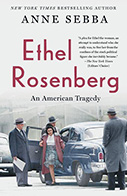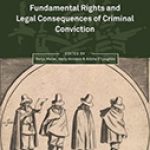Ethel Rosenberg: An American Tragedy

Author: Anne Sebba
Publisher: St. Martin’s Press, 2021. 309 pages.
Reviewer: Jerald Podair ǀ June 2022
On June 17, 1953, two days before convicted atomic bomb spy conspirators Julius and Ethel Rosenberg were scheduled to die in Sing Sing prison’s electric chair, U.S. Supreme Court Justice William O. Douglas issued a stay of execution so that the question of whether the couple had been tried under the wrong law could be adjudicated.
The Espionage Act of 1917, which had been the basis for the Rosenbergs’ convictions, authorized the death penalty for acts committed during wartime. But the Atomic Energy Act of 1946 permitted death as a punishment only if a jury had explicitly recommended it, which the Rosenberg jury had not, and only when the underlying crime had been committed with intent to harm the United States, which was at least open to interpretation. Douglas believed his stay would allow time to untangle these issues and ensure the proper legal procedures had been followed in this controversial case. Assuming matters would remain where they were until the following October, when the Court would reconvene for its regular session, he left Washington on vacation.
Douglas misjudged his Court colleagues. Hurriedly reassembling in special session on June 19, they vacated the stay by a vote of 6 to 3. Hours later, the Rosenbergs were executed.
Dissenting from that decision, Justice Felix Frankfurter criticized the rush to the electric chair. “To be writing an opinion in a case affecting two lives after the curtain has been rung down upon them has the appearance of pathetic futility,” he admitted. “But history also has its claims” (pp. 218-19).
History indeed has claimed the Rosenbergs, who as political, cultural, social, ethnic, and religious symbols and avatars, have had lives-after-death notable for their longevity, depth, and richness. They have been the subjects of plays, films, novels, poems, paintings, and a host of nonfiction books and treatments that have pored over the circumstances and legacies of their unquiet deaths. Anne Sebba’s Ethel Rosenberg: An American Tragedy is an effort to give this wife, mother, and radical a voice of her own, distinct from that of the collective “Rosenbergs.”
Ethel Rosenberg certainly merits individual treatment. A complex and deeply conflicted woman torn between the imperatives of family, marriage, motherhood, politics, and the search for self-knowledge and expression, Ethel emerges as representative of the mid-century American woman—except, of course, for her uniquely tragic fate. Her path from New York’s Lower East Side to the electric chair, in Sebba’s view, was paved by an American justice system so infected with anticommunist animus that it jettisoned the safeguards and protections that ensure every criminal defendant, no matter how reviled and unpopular, receives a fair trial.
Sebba’s account of the prosecutorial and judicial misconduct in the case of Ethel Rosenberg is damning; presiding Judge Irving Kaufman and prosecutors Irving Saypol and Roy Cohn deserved prison time more than Ethel did. She was convicted based on trial testimony from her brother and sister-in-law, David and Ruth Greenglass, that Saypol and Cohn knew was perjured. David had previously told a grand jury that Ethel had nothing to do with his and Julius Rosenberg’s espionage activities, but the prosecutors induced—or coerced—him to change his story on the witness stand at trial. Cohn also engaged in ex parte conversations with Judge Kaufman as the latter considered Ethel’s sentence. Shortly before the trial began, another member of the prosecutorial team admitted to a congressional committee that the case against Ethel was “not strong” (p. 126).
Why, then, was Ethel prosecuted? Leverage, pure and simple, argues Sebba. Saypol and Cohn used Ethel as a judicial hostage in order to force Julius to admit his guilt and ‘name names’ of others in his spy ring. While it is the usual practice of prosecutors to use threats of harsh sentences to induce co-defendants to ‘flip on their partners in crime—David and Ruth Greenglass are themselves examples of this strategy—Ethel had not committed a criminal offense; pressuring her in this way smacked of the star chamber and witch tribunals. Saypol and Cohn assumed, up to the moment of the Rosenbergs’ executions, that one or both of them would crack, confess, and name names. Neither did. “She called our bluff,” a rueful Justice Department official remarked after Ethel’s death (p. 217). The government’s failed attempt to extort her was a case of judicial murder and a true American tragedy.
But, as Justice Frankfurter observed on the day the Rosenbergs died, history also has its claims, and these demand more than adherence to proper legal procedures. Julius Rosenberg was an active spy for the Soviet Union. Ethel Rosenberg knew this. While she did not actively abet him, nor did she aid her brother and sister-in-law for that matter, she approved of what they did. Why? Sebba’s judgments here are sparing to the point of apologia. Thanks to the intercepted KGB encryptions known as the Venona Transcripts, government authorities were fully aware of Julius’ acts of espionage. Julius could have admitted them, like David Greenglass, Harry Gold (who acted as a courier between David and Julius), and even Klaus Fuchs (the nuclear scientist whose arrest in England set the FBI on the trail that led to Greenglass and Rosenberg). Had Julius cooperated, he almost certainly would have received a prison sentence, as Greenglass, Gold, and Fuchs did, and not the electric chair. Ethel would likely not have served time at all, like Ruth Greenglass, whose testimony against Ethel was perjured but who did admit to assisting in acts of espionage.
Instead, Julius and Ethel chose to double down on the fiction that Julius was completely innocent of all charges, a position they both knew was a lie. They did this knowing that their two sons, aged seven and three at the time of Ethel’s arrest, could be left without parents if the worst occurred. Sebba portrays Ethel as a devoted mother, involved with every aspect of her boys’ lives, taking parenting courses and immersing herself in the most up-to-date child-rearing literature, even while in prison. Yet Ethel chose a path that would take her out of their lives forever. She refused to tell the truth about what she had done—little or nothing, as it turned out—and instead died for what she had not done.
“Toward the end of [Ethel’s]life,” Sebba writes, “communism was no longer her predominant interest; her main concern was how to be a good person and specifically how to be a good mother” (pp 258-59). The evidence contradicts her. Ethel was a true believer in the Soviet Union. She believed it to be a good and fair country where all were equal and provided for according to their needs. She believed that the Soviet Union was a light to the world, and that the world would be better if the USSR possessed an atomic weapon. She was ready to die rather than betray those beliefs and that country, even if it meant leaving the sons she adored. “She was a good soldier,” Sebba quotes a friend of Ethel’s. “She followed the party line uncritically, unquestionably and aggressively. It wasn’t only that she followed the line, but argued for it and justified it…She was totally uncritical…. She was doctrinaire” (p. 253). In an interview decades after Ethel’s execution, David Greenglass said that, ultimately, Ethel was guilty of “stupidity” (p. 253). It is, of course, no crime to be stupid; in any event, Ethel was far from it. But she went to her death rather than betray a country ruled for decades by a mass murdering dictator and a regime that obliterated freedom and democracy wherever it extended its reach.
Sebba is correct in concluding her book with the observation that Ethel was betrayed by her mother, her brother and sister-in-law, the trial judge and prosecutors, and even the clemency-denying Presidents Truman and Eisenhower. But Ethel was a betrayer too. Sebba describes the complex interactions—blood, family, class, ethnicity, religion, ideology, country—that produced Ethel Rosenberg. Most people are able to live with all of these, never having to choose one above all the rest. Ethel Rosenberg was one of the few who did. She did not choose her country and she did not choose her children.
History exacts its claims on those who choose to die, however bravely, for false causes, be they the Confederacy, Nazism, Fascism, or Stalinism. Ethel Rosenberg was a woman of deep principle and courage, but her cause was unworthy of her. Not all victims are heroes.
Jerald Podair, Professor of History and Robert S. French Professor of American Studies, Lawrence University


